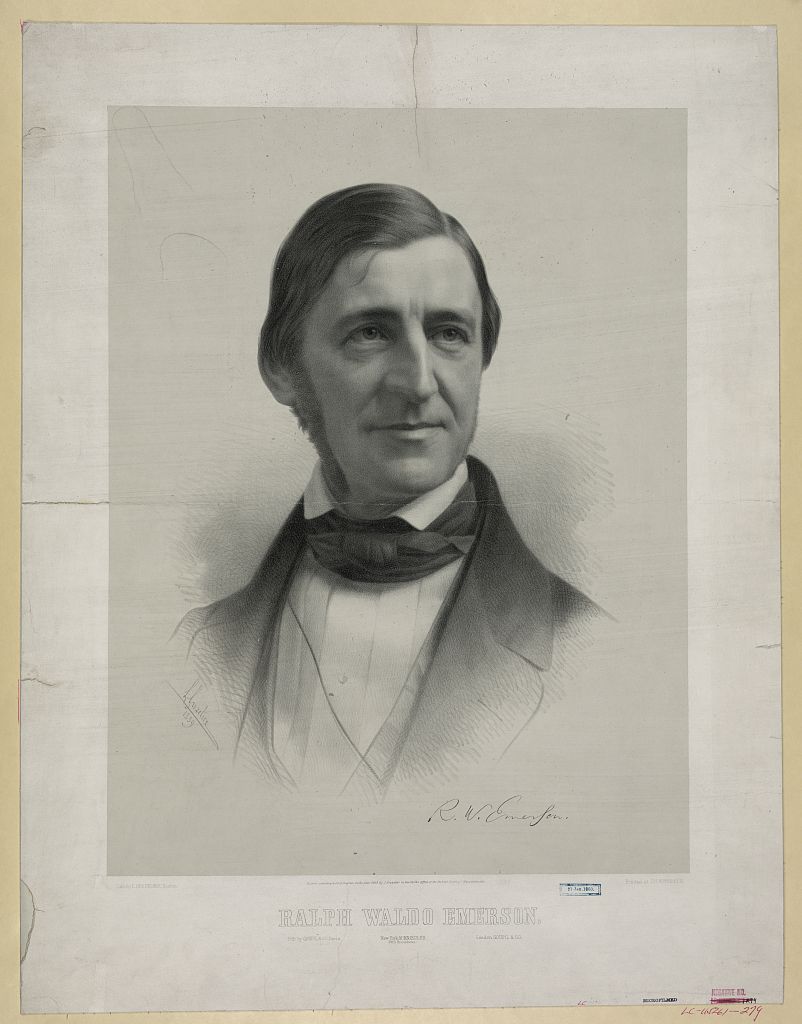“People are unhappy in large part because they are confused about what is valuable.” – William Irvine

Library of Congress
On this day two hundred seventeen years ago, Ralph Waldo Emerson was born in Boston, Massachusetts. A celebrated essayist, philosopher, lecturer, and poet, Emerson’s ideas sparked American intellectualism and birthed the Transcendental movement. Inspired by such celebrated thinkers as Montaigne, Plato, Aristotle, Locke, and Rousseau, Emerson embodies the essential work of putting knowledge to action. His work invites us into the vital work of individual reflection on the customs we follow, the traditions we continue, our motivations for them, and above all, self-reliance in our ideas.
I find Emerson an inspiration because he didn’t regard his intellect as a badge of honor. He was as educated as anyone could be, yet that wasn’t in itself a fulfillment for him. He advocated that books and the classroom exist in order to help you live your real life; to improve the person you are outside of school. He believed that you studied the lessons of history in order to find personal patterns and applications for your life, so that you don’t fall into the same traps as those before you. From history and philosophy, he learned the lessons of hubris and arrogance and the futility of pleasing society at the expense of one’s soul.
Born in 1803 to a wealthy and influential Boston family, Emerson began attending Harvard in 1817, where he was given the position of president’s freshman, and worked as messenger for Harvard’s president, John Kirkland. This allowed him to work to pay his tuition while attended classes. His studies there included Greek, Latin, mathematics, divinity, literature, history, and modern languages. Emerson also studied Shakespeare, Montaigne, and Byron outside his assigned coursework.
After graduating from Harvard, he briefly taught at a grammar school, but knew the position was not for him. He then decided to enter the ministry and went to Harvard’s School of Divinity. After a year, he was installed as a pastor at Second Church, a Unitarian church, in Boston. His weekly sermons allowed him to practice writing and public speaking on a regular schedule and he was well liked by his congregation. However, he experienced and expressed doubts about orthodox Christianity, which only deepened after tragically losing his first wife. He eventually resigned from his position in 1832. Emerson immersed himself in the wisdom of of the ancients. His studies of Plato, Aristotle, Carlyle’s, Goethe, and Montaigne, among others, began to mix with his Unitarian training and produced a unique perspective on God, nature, humanity, and the vital importance of individual revelation and conviction. He began to prepare his thoughts for public publication, and to lecture on them. This lecturing career would last over forty years. Audiences were intrigued and receptive of his ideas, both in America and throughout Europe.
Paramount to the development of Emerson’s lectures was his daily journal keeping. The oldest surviving journal we have is from Emerson’s college years. His daily reflections and working out of theories went on to inspire his lectures, essays, and books. Emerson shared his love of journaling with his inner circle, even inspiring Henry David Thoreau to begin writing daily. Thoreau’s journal ended up giving the world Walden and Civil Disobedience, two tomes still inspiring and guiding lives well over a century later. Emerson continued journaling for more than fifty years until 1875, when his declining health prevented him from doing so.
While his lectures and essays are impressive, it is his tireless optimism towards the human spirit which is endlessly refreshing and continually inspiring. It’s easy to see the good in humanity when times are peaceful and life is simple. However, Emerson’s life and work transpired against the backdrop of the American Civil War, four years of intense fighting in which brother took up arms against brother. He had viewed the darkness which man is capable of inhabiting, yet his optimism did not wane. Emerson challenged dogma and tradition, instead endeavoring for personal insight and conviction. He advocated for individual action because he believed that if we each were to be honest with ourselves, and would examine our own motives around the institutions we support, we would unapologetically abandon those which don’t no longer truly reflect our priorities. If we stopped to consider what we were supporting and why – if we considered what was truly valuable – suddenly, it becomes simple to walk away from unworthy causes.
Emerson’s support of the abolitionist movement underscores his commitment to put action to his knowledge. His understanding of the conflict was not purely intellectual. He took a stand and spoke out against the horror of slavery, proving that intellectualism does not preclude one from taking action. I think it is impossible to accurately appreciate Emerson’s calls to action and reflection without acknowledging that his audience is a nation on the brink of war. During the 1830s, Emerson became increasingly involved in the abolitionist cause. This makes his calls for individual reflection about social norms all the more powerful. He is not removed from the world and her problems, but traveling the country, seeing first hand how tensions are rising – how the defense of “social institutions” was becoming a horrific euphemism – and taking a forceful stand against slavery. Over the next decade, he would continue to travel the country speaking at various abolitionist meetings well into the 1850s.
Emerson held various esteemed positions throughout his life, and was a member of several clubs – including the Aidirondacks, and Saturday clubs, in addition to his Transcendental club. His work was widely appreciated during his lifetime, and he continued to publish collections of essays and lecturing across America to Europe until the 1870s, when his health began to decline. Tragically, his twilight years were marked by memory problems, which effectively ended his career. He died in 1882 and is buried in Sleepy Hollow Cemetery in Concord, Mass.
Emerson has come to be a major influence in my reading and writing; reading, because he admonishes against tradition for its own sake. He challenges his readers to get outside the library and put to use the things they learn for themselves. Studying is no substitute for living. Emerson’s life is a testament to learning in order to improve and impact your life, not blindly following tradition. The exuberance with which Emerson writes and the persistence to always seek the best from his readers are qualities I aspire to reflect in my own writing. His genuine belief in the potential of humanity, and the influence of individual decisions, continues to inspire us centuries later.
Through these lessons of individual self-reliance, daily journaling, the complimentary qualities of labor and knowledge, and a deep understanding of one’s motives and purpose in society, Emerson’s teachings and example beckon us to take the slower, more intentional path through life.
More Emerson on this blog:
The American Scholar
Exploring six notable essays from his First and Second Series.
Emerson on Montaigne
His lovely Tribute to Thoreau




